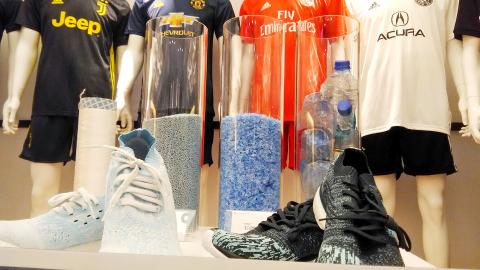Polyester and textile maker Far Eastern New Century Corp (FENC, 遠東新世紀) yesterday unveiled the world’s first all-in-one chemical recycling solution for post-consumer waste textiles, which it said would support the circular economy and help maintain its leadership in smart textile innovation.
“The solution, FENC TopGreen rTex, closes the loop of current PET recycling, diverting what was once destined for landfills to value-added new consumer goods,” FENC president Eric Hu (胡正隆) told a news conference in Taipei.
Textile waste is a growing problem and the popularity of “fast fashion” has only exacerbated the problem, Hu said.

Photo: CNA
According to the US-based Council for Textile Recycling, the US generates 11 million tonnes of textile waste a year, with 85 percent of post-consumer textile waste ending up in landfills and just 15 percent reused or downcycled.
The firm’s new process can help recycle polyester from all types of used textiles, including mixed streams, FENC Research and Development, Innovation, Marketing and Partnership manager Jeffrey Hsu (許嘉夫) said.
Collected post-consumer textiles are separated without a need for additional decoloring or use of complex solvents, Hsu said.
The polyester is dissolved and the mixed polymers and dyestuffs are filtered out, he said, adding that cellulose isolated in the process is converted into energy-dense fuel rods which can generate electricity.
The company has a product line made from recycled PET bottles, which is used in a wide range of applications, from injection-molded products to footwear and clothing, Hu said.
The Taipei-based company supplies polyester-related materials to major global sports, outdoor, leisure and fast fashion brands.
Since 2015, FENC has collaborated with Adidas AG to commercialize trainers using recycled plastic dredged from the oceans to raise awareness of the environmental issue, Hu said.
The collaboration reprocessed more than 1,000 tonnes of marine waste last year and the volume is expected to grow to 1,600 tonnes this year.
The German brand is phasing out the use of virgin polyester in all shoes and clothing, and has committed to using only recycled plastics by 2024.
Recycled products accounted for 26 percent of FENC offering last year and their share is rapidly expanding, FENC Polyester Division manager Eva Luo (羅怡文) said.
A manufacturing facility in Japan is adding 50,000 tonnes of annual capacity by 2020 to meet rising demand ahead of the Tokyo Summer Olympics, Luo added.
FENC has also approved plans to build a plant in the Philippines that would add 36,000 tonnes of anjual capacity.
“Ever more consumers are willing to spend more on products that are friendly to the environment,” Hu said.

Taiwan Semiconductor Manufacturing Co (TSMC, 台積電) secured a record 70.2 percent share of the global foundry business in the second quarter, up from 67.6 percent the previous quarter, and continued widening its lead over second-placed Samsung Electronics Co, TrendForce Corp (集邦科技) said on Monday. TSMC posted US$30.24 billion in sales in the April-to-June period, up 18.5 percent from the previous quarter, driven by major smartphone customers entering their ramp-up cycle and robust demand for artificial intelligence chips, laptops and PCs, which boosted wafer shipments and average selling prices, TrendForce said in a report. Samsung’s sales also grew in the second quarter, up

LIMITED IMPACT: Investor confidence was likely sustained by its relatively small exposure to the Chinese market, as only less advanced chips are made in Nanjing Taiwan Semiconductor Manufacturing Co (TSMC, 台積電) saw its stock price close steady yesterday in a sign that the loss of the validated end user (VEU) status for its Nanjing, China, fab should have a mild impact on the world’s biggest contract chipmaker financially and technologically. Media reports about the waiver loss sent TSMC down 1.29 percent during the early trading session yesterday, but the stock soon regained strength and ended at NT$1,160, unchanged from Tuesday. Investors’ confidence in TSMC was likely built on its relatively small exposure to the Chinese market, as Chinese customers contributed about 9 percent to TSMC’s revenue last

LOOPHOLES: The move is to end a break that was aiding foreign producers without any similar benefit for US manufacturers, the US Department of Commerce said US President Donald Trump’s administration would make it harder for Samsung Electronics Co and SK Hynix Inc to ship critical equipment to their chipmaking operations in China, dealing a potential blow to the companies’ production in the world’s largest semiconductor market. The US Department of Commerce in a notice published on Friday said that it was revoking waivers for Samsung and SK Hynix to use US technologies in their Chinese operations. The companies had been operating in China under regulations that allow them to import chipmaking equipment without applying for a new license each time. The move would revise what is known

UNCERTAINTY: A final ruling against the president’s tariffs would upend his trade deals and force the government to content with billions of dollars in refunds The legal fight over US President Donald Trump’s global tariffs is deepening after a federal appeals court ruled the levies were issued illegally under an emergency law, extending the chaos in global trade. A 7-4 decision by a panel of judges on Friday was a major setback for Trump, even as it gives both sides something to boast about. The majority upheld a May ruling by the Court of International Trade that the tariffs were illegal. However, the judges left the levies intact while the case proceeds, as Trump had requested, and suggested that any injunction could potentially be narrowed to apply